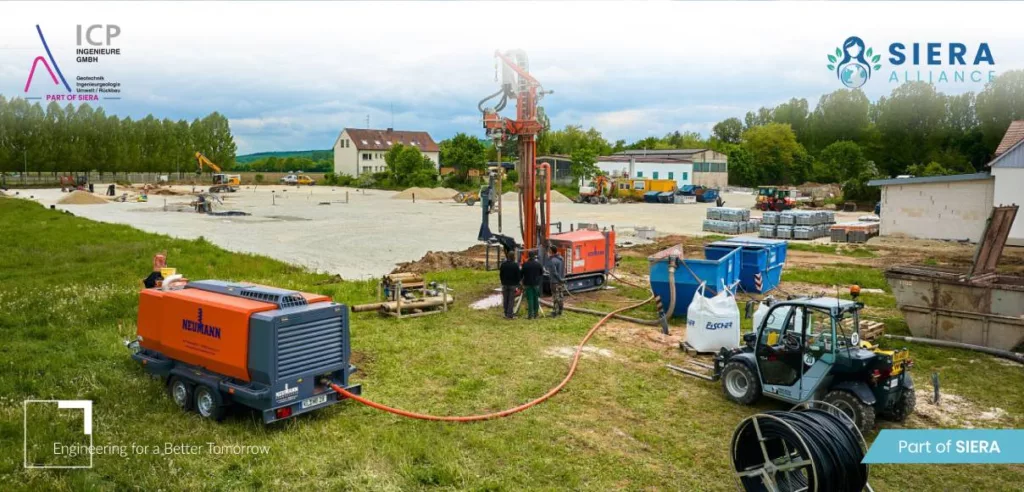Geothermal energy is among the most reliable and sustainable energy sources of the future. It harnesses the heat stored in the ground and—unlike wind and solar—geothermal energy is available year-round, independent of weather conditions and on a continuous basis—an essential advantage for a stable, climate-neutral energy supply.
ICP Ingenieure GmbH – part of SIERA is a German geoscience and engineering firm (since 1992) specializing in geothermal energy. Our services include the Geothermal Energy Site Check, probe system design, regulatory support, and quality assurance—delivered across three locations with roughly 500 projects per year.
Basics of Geothermal Energy
With increasing depth, subsurface temperature rises on average by about 3 °C per 100 meters. This energy can be used technically—either via near-surface systems (borehole heat exchangers, collectors, groundwater wells) or via deep geothermal plants, in which hot deep groundwater is brought to the surface for heat or power generation.
Near-surface geothermal energy: Utilization of the thermal potential down to approx. 400 m depth via borehole heat exchangers or collectors, combined with heat pumps for efficient heating and cooling of buildings.
Deep geothermal energy: Utilization of deep aquifers and rock heat at depths of several kilometers to supply district heating networks or generate electricity.
Why Geothermal Energy Matters
Around 50% of Germany’s total energy demand is for heat. Here, geothermal energy offers enormous potential to permanently replace fossil fuels.
Its advantages are clear:
- Renewable and low-emission
- Independent of weather and time of day
- Long-term cost-efficient and low-maintenance
- Regionally available—energy from our own ground
As part of the energy transition, geothermal energy plays a central role in decarbonizing the building sector and contributes significantly to a sustainable heat supply.
Design and Verification – EED Calculations
For cost-effective and technically safe planning of ground-source systems, precise sizing of borehole fields is crucial.
Our engineering office performs EED (Earth Energy Designer) calculations in line with recognized technical guidelines.
These simulations enable:
- Dimensioning of borehole heat-exchanger fields,
- Calculation of temperature trends and seasonal performance factors,
- Forecasting the long-term thermal development of the subsurface,
- Optimization of system efficiency.
In this way, we ensure that every geothermal system can be operated efficiently, adapted to the site, and sustainably.
Site Assessment – Geothermal Check
Before planning a system, we examine with our Geothermal Check whether a site is fundamentally suitable for geothermal use.
We assess:
- Geological and hydrogeological conditions,
- Possible usage constraints or protected areas,
- Regulatory requirements (e.g., groundwater protection, drilling permits, water law requirements).
The Geothermal Check serves as a decision-relevant basis for clients, planners, and municipalities to evaluate the feasibility and permitting prospects of geothermal use at an early stage.
Science and Engineering Practice
Our work connects geoscientific insights with engineering design. Through geological site analyses, thermal conductivity tests, and numerical simulations, we create a solid foundation for every geothermal system—from single-family homes to large-scale projects.
Conclusion
Geothermal energy is a central building block of a climate-neutral energy future. With Geothermal Checks, EED calculations, and robust geotechnical planning, we help our clients use energy from the ground efficiently, safely, and sustainably.
The heat of tomorrow lies beneath our feet—we make it plannable.
➡️ Learn more about our geothermal services and contact the team at ICP Ingenieure GmbH.












